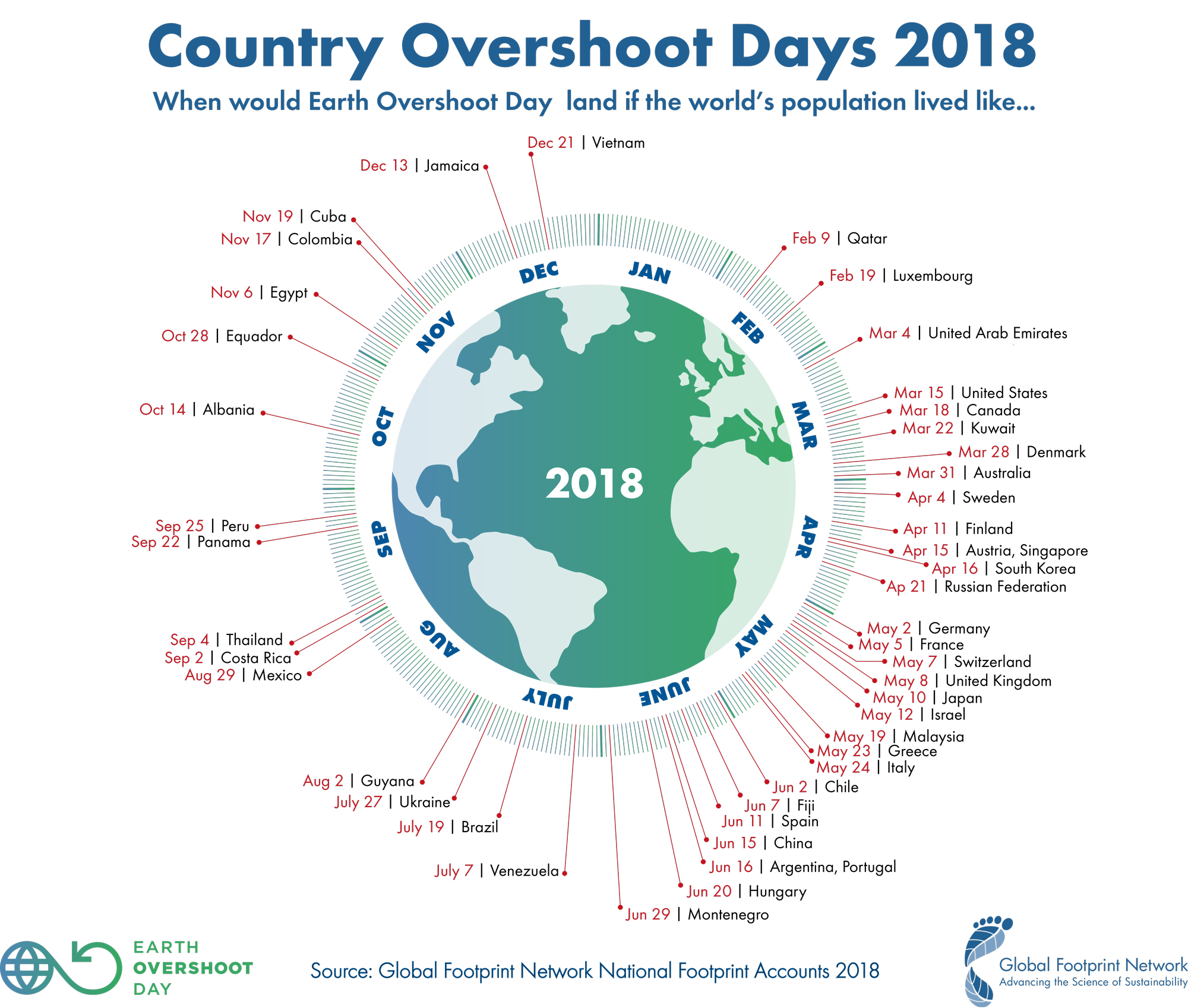The first of August was Earth Overshoot Day, according to the Global Footprint Network, meaning that for the rest of the year humanity as a whole will consume resources faster than the Earth can replenish them. According to the website www.overshootday.org we are now "using 1,7 Earths. We use more ecological resources and services than nature can regenerate through overfishing, overharvesting forests, and emitting more carbon dioxide into the atmosphere than ecosystems can absorb." The countries most responsible for this rampant overconsumption are pointed out in a diagram:
The United States and the Gulf states are among the worst sinners according to their data. Most educated people are probably not surprised by this; but some may be surprised that the oh-so-progressive Nordic countries are all in the top ten (except for Norway which is strangely absent). Many Swedes too would be surprised by this, because - dear foreigners - Sweden is a country where we tell ourselves that we are ahead in transitioning to a sustainable economy. Swedish politicians frequently speak of the need for Sweden to "lead by example" on environmental issues. I believe the above picture sufficiently shows how utterly absurd this worldview is.
The question is: what would happen to the liberal, egalitarian, individualistic culture of a country like Sweden if consumption rates could not be maintained at present levels? The welfare state and the world market have together made many Swedes into truly autonomous individuals, not needing to rely directly on any other human being. Of course, the goods that you buy at the supermarket (or increasingly online) were produced by real people, but these are not people that you have to meet in person, thus the illusion of social equality can be maintained within the country's borders. Or take a more concrete example from another north European country:
In Bhilwara district, in the northern Indian state of Rajasthan, sandstone slabs form a makeshift fence around a field, marking the boundaries of a temporary worksite. In the centre, *Seema, a tall young woman, lifts sandstone cobbles into large wooden crates.
A firm in Jaipur, the state capital, has ordered the stones for export to Britain, where they will be used to pave streets and build sea defences.
Employed by a contractor on piece-rate wages, Seema has no idea where the stones will end up. She arrives for work at 8am, after cooking and cleaning for her family, and works through the peak afternoon heat, her thumb bandaged from recurring cuts. She will be paid 60 rupees (66p) for each crate she fills.
Would Britain be able to import this cobblestone if the women working in these mines had British wages? Be the answer yes or no, it is merely one example of where the wealth and liberty of modern countries and individuals rests on the backs of the super-exploited poor. This has little to do with "capitalism" per se - exploitation such as this is arguably less severe today than in past eras. Nor do I want to fall into the Marxist trap of thinking that "inequality" is the problem here which must be uprooted. Any complex societies must have hierarchies - there are simply no examples of the opposite being true. Rather, what I find rather devious is the collective illusion held in certain wealthy countries that "we are all equals", an illusion that is built on an invisible division of labor between the "core" and the "periphery" in the world system. This illusion allows for a culture to develop within a country where titles are abolished, where social etiquette is no longer required, where everything is just "casual" and "funny" and a little bit childish. Imagine instead if the entire world was one country, where extreme wealth and poverty co-existed door to door (which is of course the case in many dysfunctional states). In such a world, the well-off could not afford to be casual liberals; they would have to fight tooth and claw to maintain their property and privileges, and in the process they would have to explain to themselves and others why they should be entitled to such privilege. Perhaps they are fundamentally different from the poor? Perhaps they have a divine origin or something? Thus backward in time from the illusion of equality to various illusions of inequality.

No comments:
Post a Comment